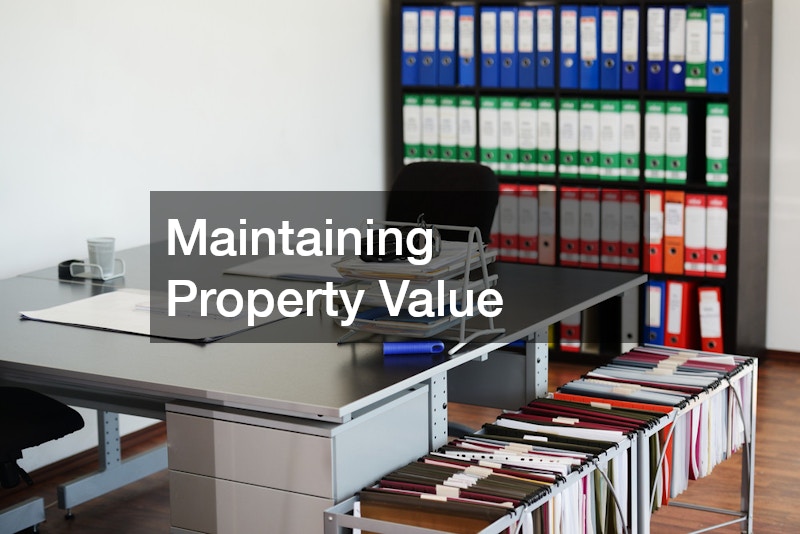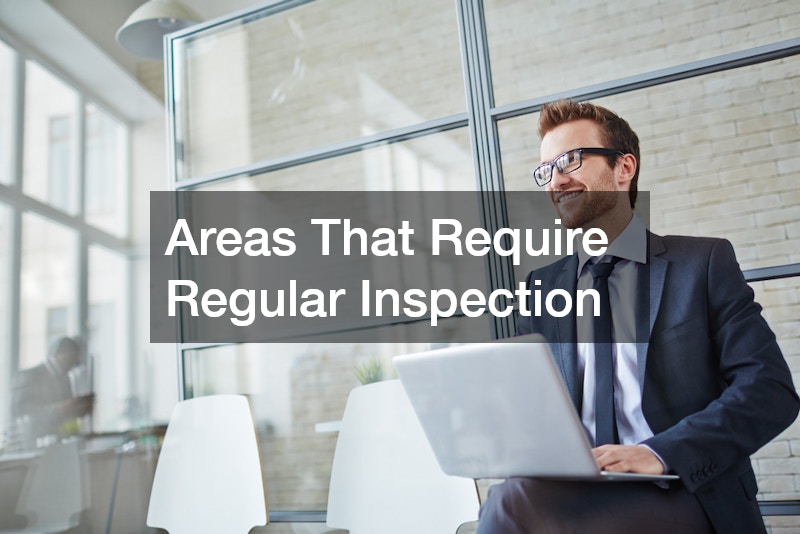Owning a commercial property is both an exciting investment and a major responsibility. Whether you manage an office building, retail space, warehouse, or mixed-use property, it represents a valuable asset that requires regular care. While it’s easy to focus on big upgrades or tenant management, one of the most crucial — and often overlooked — parts of ownership is scheduling consistent inspections.
Regular inspections aren’t just about finding visible damage. They’re about identifying small issues before they turn into expensive problems, ensuring safety compliance, and preserving the property’s long-term value. For commercial property owners, these checkups are the difference between smooth operations and costly downtime.
From roof and electrical systems to fire alarms and parking lots, every element of a commercial building needs periodic evaluation. Let’s explore why inspections matter so much, what areas require attention, and how proactive maintenance keeps your business running efficiently year-round.

Protecting Your Investment
Identifying Small Issues Before They Become Major Problems
Even the most solidly built commercial property can develop wear and tear over time. Tiny leaks, cracks, or mechanical issues often go unnoticed until they cause significant damage. Regular inspections allow property owners to identify these problems early.
For instance, a minor roof leak might seem harmless during a light rain. But without prompt attention, it can lead to mold, damaged insulation, or structural decay. The same goes for plumbing or HVAC issues that can escalate into major repairs. Routine checks by professionals make it possible to fix small concerns before they require large-scale restoration.
Regular building inspections are like preventative healthcare for your property — they minimize risk, reduce unexpected costs, and extend the life of your structure.
Extending the Lifespan of Building Systems
Every commercial building relies on complex systems that must work in harmony — electrical, plumbing, roofing, and mechanical networks. Over time, these systems naturally degrade. By inspecting them regularly, you catch wear and inefficiencies that can shorten their lifespan.
Scheduling routine assessments for things like ventilation, structural support, and energy efficiency ensures your property operates at peak performance. Inspections also give you the chance to plan ahead for replacements, avoiding surprise failures that disrupt tenants and operations.
Ensuring Safety and Compliance
Meeting Local Building Codes and Regulations
Commercial properties are subject to strict safety standards and building codes. Routine inspections are essential for staying compliant with these regulations, as they evolve over time.
Inspectors check everything from emergency exits and signage to the condition of handrails and fire systems. If your property includes an elevator, scheduling commercial elevator service helps confirm it meets safety standards and functions smoothly for tenants and visitors. These checkups not only protect users but also keep your business compliant with local and federal regulations.
Failure to meet inspection requirements can result in fines, legal issues, or even temporary closure — all of which can be avoided with proactive maintenance.
Protecting Tenants and Visitors
A safe environment is vital for both tenant satisfaction and liability protection. Regular inspections identify potential hazards such as water leaks, uneven flooring, or electrical faults before they cause harm.
By addressing safety risks early, you demonstrate a commitment to the well-being of everyone who visits or works on your property. Not only does this foster trust among tenants, but it also reduces the likelihood of accidents that could lead to lawsuits or insurance claims.
Keeping a detailed log of inspection reports provides proof that you’re meeting your responsibilities as a property owner.

Maintaining Property Value
Curb Appeal and Structural Integrity
The condition of your property speaks volumes to tenants, clients, and future buyers. A well-maintained building not only functions better but also looks more appealing. Regular inspections help preserve curb appeal by identifying cracks in walkways, peeling paint, or damaged doors before they create a negative impression.
If your building has glass entrances or storefronts, consider scheduling commercial glass door repairs to maintain a professional appearance and energy efficiency. Clean, functional entryways are often the first thing people notice — and they send a strong message about how the property is managed.
Beyond appearance, structural integrity is equally important. Inspections ensure foundations remain stable and exterior materials hold up against the elements. Maintaining both aesthetics and structure preserves long-term value.
Preventing Depreciation
Commercial properties represent substantial investments, and their value can decline without consistent care. Preventive inspections and documentation show that a building is being actively maintained. This makes a significant difference when refinancing, renewing insurance, or preparing to sell.
Keeping a detailed record of inspections and repairs adds credibility for potential investors or buyers. They’ll appreciate knowing the property has been cared for and is less likely to require major repairs in the near future.
Reducing Liability Risks
Legal and Financial Protection
Neglecting inspections can lead to serious liability risks. Property owners are legally responsible for maintaining a safe environment, and failing to identify or repair issues could lead to injury claims or legal disputes.
Routine inspections help reduce that risk by catching hazards before they cause harm. From faulty wiring to loose railings, regular maintenance shows due diligence and can serve as a powerful defense if any incidents occur.
Proactive management isn’t just about compliance — it’s about protecting your reputation and financial stability.
Insurance and Claim Support
When accidents or disasters happen, documentation from inspections becomes invaluable. Insurance companies often require proof of ongoing maintenance to process claims quickly and fairly.
Keeping up with inspections can also influence premiums. Many insurers offer better rates to property owners who maintain regular checkups because it demonstrates a lower risk of unexpected failures.
Regular maintenance, clear records, and transparent communication make it easier to resolve issues efficiently — saving you both time and money in the long run.

Areas That Require Regular Inspection
Roofing and Drainage Systems
The roof is one of the most critical and vulnerable parts of any commercial property. It shields everything beneath it from rain, wind, and snow. Unfortunately, it’s also one of the most commonly neglected areas.
Scheduling biannual inspections with professional commercial roofers helps detect leaks, membrane wear, and insulation issues before they cause major problems. Inspections should also include drains, flashing, and gutters to ensure water flows away from the building effectively.
Proper roof maintenance protects inventory, equipment, and tenant operations — all while extending the roof’s lifespan.
Parking Lots and Pavement
Your parking lot is often the first impression clients and tenants get of your property. Cracked or uneven pavement isn’t just unattractive; it can pose safety risks and damage vehicles.
Working with commercial paving companies ensures your lot remains safe, smooth, and compliant with accessibility standards. Professionals can identify early signs of wear like potholes or drainage problems and address them before they worsen.
Regular pavement sealing and striping also keep your property looking sharp and professional.
Electrical and Mechanical Systems
Electrical systems power everything from lights to computers, machinery, and HVAC units. Over time, wires can fray, connections loosen, and circuits become overloaded.
Hiring commercial electricians for periodic assessments ensures all systems operate safely and efficiently. They can identify outdated panels, potential fire hazards, and energy-draining components that might otherwise go unnoticed.
Beyond safety, electrical inspections improve performance, reduce downtime, and contribute to lower utility bills.
Fire Safety and Emergency Systems
Fire prevention is a non-negotiable aspect of commercial property management. Inspecting fire extinguishers, sprinklers, and alarms is critical for ensuring readiness in case of emergencies.
Regular testing and maintenance of commercial fire alarms verify that every alert system works properly. These inspections save lives, protect property, and keep you compliant with safety codes.
Emergency lighting, exit signage, and evacuation routes should also be reviewed during inspections to ensure everything is visible and accessible.
Heating, Cooling, and Fuel Systems
Temperature control affects everything from employee comfort to equipment function. HVAC systems require seasonal inspections to operate efficiently. Filters, ducts, and thermostats should be cleaned or replaced regularly.
If your building relies on propane for heating or machinery, coordinate with a reliable commercial propane service for annual safety checks. Fuel systems must be inspected to prevent leaks and maintain consistent performance during high-demand seasons.
Staying proactive about heating and energy systems ensures your tenants stay comfortable and operations remain uninterrupted.
Exterior Features and Grounds
Landscaping, fencing, and outdoor signage all play a role in how your property is perceived and how well it functions. Trees, shrubs, and lawns should be trimmed to prevent overgrowth or damage to structures.
Partnering with a professional tree company keeps your property safe from falling branches, root interference, and pest infestations. They can assess tree health and remove hazards before they affect buildings or power lines.
For perimeter security and aesthetics, scheduling routine maintenance through commercial fence installation specialists keeps fencing sturdy, aligned, and visually appealing. A well-kept boundary improves safety and enhances your property’s appearance.
Doors, Windows, and Entryways
Doors and windows experience heavy daily use in commercial buildings, which makes them prone to wear. Cracked seals, broken locks, and warped frames can compromise security and efficiency.
Calling replacement window services for damaged or outdated windows can improve energy savings and reduce noise pollution. Properly sealed and insulated windows also help regulate indoor temperatures.
For sliding or automated glass entrances, plan for regular maintenance to prevent malfunctions and maintain accessibility for everyone.
Scheduling and Recordkeeping
How Often to Schedule Inspections
Inspection frequency depends on the building’s size, age, and purpose, but a good rule of thumb is quarterly or seasonal reviews. High-traffic properties or those exposed to extreme weather may require more frequent visits.
-
Roof and drainage systems: Twice a year, ideally in spring and fall.
-
HVAC systems: At least once per season.
-
Electrical and fire systems: Annually or as required by local code.
-
Exterior and pavement: Annually, with touch-ups as needed.
Working with trusted vendors ensures consistency and peace of mind.
Keeping Organized Inspection Records
Detailed documentation is one of the most valuable tools a property owner can maintain. Each inspection should generate a written report outlining findings, recommended repairs, and completion dates.
Digital storage makes it easy to track patterns over time, ensuring no issue slips through the cracks. These records are especially useful when filing insurance claims, applying for permits, or selling the property.

Choosing Professional Inspectors
Working With Trusted Experts
A quality inspection starts with qualified professionals. Hiring experienced contractors ensures that no part of your property is overlooked. It’s wise to choose licensed and insured vendors who specialize in commercial buildings, as these structures differ significantly from residential properties.
For example, commercial roofing contractors possess the knowledge and tools to assess large-scale roofs safely and efficiently. Similarly, electricians, plumbers, and HVAC technicians familiar with commercial systems can identify potential risks that general handymen might miss.
Assembling a network of trusted service providers gives you reliable support for every aspect of your property’s maintenance.
Creating a Long-Term Maintenance Partnership
Building ongoing relationships with your vendors fosters consistency. When service providers understand your property’s layout, systems, and history, they can make more accurate recommendations and provide faster service.
Establishing annual or semi-annual contracts with key providers — such as a commercial cleaning company — ensures that essential maintenance tasks are completed regularly. Clean, well-maintained spaces enhance tenant satisfaction and reflect positively on your management style.
Long-term partnerships also mean better communication, priority scheduling, and potential cost savings.
The Financial Benefits of Regular Inspections
Lower Repair and Replacement Costs
Preventive maintenance may seem like an expense, but it saves far more money than it costs. A $300 inspection can identify a $3,000 issue before it becomes a $30,000 disaster.
For example, early detection of a plumbing leak or roof weakness can prevent widespread damage to flooring, ceilings, and equipment. These savings compound over time, making inspections one of the most financially responsible steps a property owner can take.
Better Tenant Retention and Reputation
Tenants want stability and professionalism from their landlords. When property owners consistently maintain and inspect their buildings, tenants notice — and they’re more likely to renew their leases.
Word-of-mouth referrals are powerful in the commercial real estate world. A reputation for maintaining safe, clean, and efficient properties can attract higher-quality tenants and justify better rental rates.
Happy tenants also mean fewer disputes, reduced vacancy periods, and less stress for property owners.
Regular inspections aren’t just routine — they’re a cornerstone of responsible commercial property ownership. By staying proactive, you protect your investment, safeguard tenants, and ensure your property remains in excellent condition for years to come.
From roofs and electrical systems to elevators and exterior grounds, every part of your building deserves attention. Partnering with professionals — whether it’s electricians, roofers, or cleaning specialists — ensures thorough, consistent care.
Ultimately, regular inspections save money, reduce risk, and preserve the long-term value of your property. They’re not just maintenance tasks — they’re an investment in the future of your business and your reputation as a diligent, forward-thinking owner.




